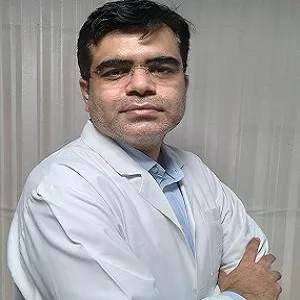Deep Vein Thrombosis Treatment in Chunni-ganj, Kanpur
Deep vein thrombosis (DVT) refers to a medical condition wherein a blood clot is formed in a deep vein. This condition usually happens in the legs but can occur in other parts of your body as well. It can take place in one or more veins. Deep vein thrombosis can be accompanied by symptoms such as pain and swelling and oftentimes it is also asymptomatic. There are other names associated with this condition including thromboembolism, post-thrombotic syndrome, and postphlebitic syndrome. This medical condition can also lead to more serious issues and can even prove to be fatal in some cases.
What are the Symptoms of Deep Vein Thrombosis?
Although all patients may not show the symptoms of Deep vein thrombosis, almost half of the people suffering from DVT will show the symptoms. The symptoms of deep vein thrombosis include:
- Swollen foot, ankle, or leg
- Severe pain around foot and ankle
- Pale, reddish, or blue skin texture around the affected area
- Warmer skin around the affected area
- Leg cramps initially felt around the calf
- Swollen or red veins
- Chest tightening
- Coughing with blood discharge
- Painful breathing
- Shortness of breath
- A faster rate of heartbeat
What are the Causes of Deep Vein Thrombosis?
Anything that creates a blockage for the blood from flowing or clotting can cause a blood clot, which leads to Deep Vein Thrombosis. Clotting may take place because of several reasons, such as:
- Injury – If during an injury, a blood vessel’s wall is narrowed or the blood flow is blocked, it leads to clotting.
- Surgery - Blood vessels are often at a risk of getting damaged during surgery, which can lead to the clotting of blood.
- Reduced mobility - When you sit in the same posture for a prolonged period, blood can collect in your legs causing blood to clot.
- Some medications may also give rise to the chances of blood clotting.
You may also have an increased chance of getting Deep Vein Thrombosis because of the following reasons:
- It may be hereditary
- When you’re pregnant or if you’ve just given birth
- Bed rest
- Higher body mass index
- Other medical conditions such as heart disease, lung disease, and inflammatory bowel disease
How to Prevent Deep Vein Thrombosis?
You can reduce the risk of Deep vein thrombosis by:
- Keeping your body active. Do not sit at the same place for too long. Practice physical activity daily.
- Getting back on your feet as soon as possible if you’ve had surgery. Minimum movement of the body can also make a huge difference.
- Keeping yourself hydrated. Drink plenty of water and avoid the intake of alcohol. If your body is deprived of enough fluids, there are increased chances of blood clotting.
- Maintaining a balanced body mass index.
- Quit smoking.
- If you suffer from any other chronic illness, it is very important that you manage these health issues efficiently.
How to Treat Deep Vein Thrombosis?
Mostly, medication and proper care can help with the condition. However, you may need surgery in aggravated cases. Talk to your doctor at Apollo Spectra, Kanpur about which form of treatment fits best for you.
- Blood thinners, also known as anticoagulants, are the most common type of treatment available for DVT. They strain a clot from growing or breaking off and also prevent new clots from forming.
- Clot-busting, wherein your body dissolves the blood clot with time. But it can damage the inside of your vein.
- Wearing compression stockings can also prevent swelling and may lower your chance of developing clots.
- DVT Surgery – surgery is recommended only in the case of very large blood clots or clots that cause serious issues, like tissue damage.
Request an appointment at Apollo Spectra Hospitals, Kanpur
Call 1860-500-2244 to book an appointment
Deep vein thrombosis can often go unnoticed and dissolve on its own. But it may sometimes cause symptoms like pain and swelling.
Yes, a blood clot in your vein is an emergency as it can often lead to life-threatening complications if left untreated.
You can use compressed stocking, keep the affected leg in an elevated space, and take walks to treat blood clots at home.
Symptoms
Our Doctors
DR. ACHINTYA SHARMA
MBBS, MS,MCh...
| Experience | : | 7 Yeras Experience |
|---|---|---|
| Speciality | : | Vascular Surgery... | Location | : | Chunni Ganj |
| Timings | : | Available by prior a... |
Our Top Specialities
NOTICE BOARD
CONTACT US
CONTACT US
 Book Appointment
Book Appointment



.svg)
.svg)
.svg)
.svg)








